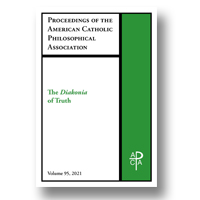|
session viii: humorous or serious? |
|
21.
|
Proceedings of the American Catholic Philosophical Association:
Volume >
87
Mathew Lu
Getting Serious about Seriousness:
On the Meaning of Spoudaios in Aristotle’s Ethics
abstract |
view |
rights & permissions
| cited by
In the following paper I discuss the under-appreciated role that the concept of the morally serious (spoudaios) person plays in Aristotle’s moral philosophy. I argue that the conventional English rendering of spoudaios as “good” has a tendency to cut us off from important nuances in Aristotle’s consideration of the virtuous person. After discussing aspects of his use of the concept in the Nicomachean Ethics and the Politics I dismiss a misunderstanding of seriousness as a kind of morally indifferent personality trait. I close by briefly reflecting on how an absence of moral seriousness characterizes much contemporary moral theorizing and produces what Anscombe described as the “corrupt mind.”
|
|
|
|
|
22.
|
Proceedings of the American Catholic Philosophical Association:
Volume >
87
Joshua Schulz
How Do You Know If You Haven’t Tried It?:
Aristotelian Reflections on Hateful Humor
abstract |
view |
rights & permissions
| cited by
Howard Curzer argues that Aristotle’s virtue of wit is a social virtue, a form of philia: conversation with a witty person is pleasing rather than offensive or hateful. On the basis of an analogy between wit and temperance, Curzer holds that the witty person is good at detecting (and avoiding) hateful humor but is not necessarily an expert in judging the funniness of jokes. Curzer thus defends a moderate position in contemporary philosophy of humor—a Detraction Account of hateful humor—arguing that the humorousness of a joke is an aggregate pleasure resulting from several factors in addition to funniness. While sympathetic to Curzer’s overall approach to wit, this essay criticizes the Detraction Account as inconsistent with Aristotle’s text and implausible in its own right, and suggests a friendly amendment based on those criticisms.
|
|
|
|
|
acpa reports and minutes |
|
23.
|
Proceedings of the American Catholic Philosophical Association:
Volume >
87
R. E. Houser
Minutes of the 2013 Executive Council Meeting
view |
rights & permissions
| cited by
|
|
|
|
|
24.
|
Proceedings of the American Catholic Philosophical Association:
Volume >
87
R. E. Houser
Secretary’s Report (2012–2013)
view |
rights & permissions
| cited by
|
|
|
|
|
25.
|
Proceedings of the American Catholic Philosophical Association:
Volume >
87
Treasurer’s Report (2012)
view |
rights & permissions
| cited by
|
|
|
|
|
26.
|
Proceedings of the American Catholic Philosophical Association:
Volume >
87
Financial Statements (2011 and 2012)
view |
rights & permissions
| cited by
|
|
|
|
|
27.
|
Proceedings of the American Catholic Philosophical Association:
Volume >
87
Available Back Issues of the Proceedings
view |
rights & permissions
| cited by
|
|
|
|





